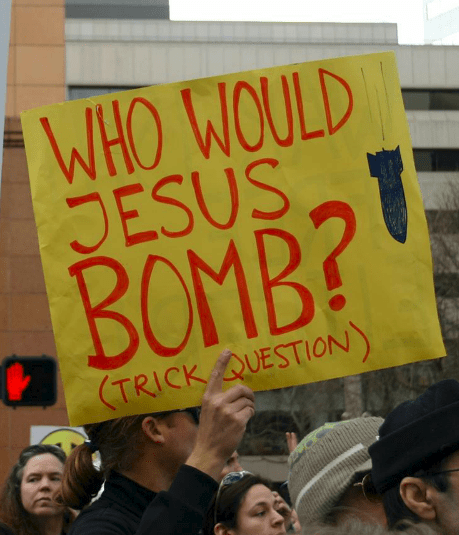Iran Bombing Threat: Creating a Mindset that Leads to War – by Chris Iosso

Read Bruce Gillette’s Essay, “A Response to ‘Iran Bombing Threat'”
Read Ray Roberts’ Essay, “A Response to ‘Iran Bombing Threat'”
Read this article as published on Unbound
The first thing one encounters in discussing the war drumbeat targeting Iran is the one-sidedness of the debate. Glenn Greenwald of Salon gives a quick summary on this point, and James Wall, former Christian Century editor, describes the same reality. This suggests that the talk of war with Iran, though helpfully called, “loose talk,” by President Obama in his Sunday, March 4, speech to the American Israeli Public Affairs Committee (AIPAC), is actually quite deliberate and orchestrated talk designed to create a mindset favoring war. And even if this talk is a repeated strategy to distract the U.S. public from continued settlements or other Israeli political objectives, it continues to militarize U.S. foreign policy and affects our relations not just with Iran, but with the larger community of nations. In practical terms, it keeps us from building stronger alliances to deal with the crisis in Syria (for example) and revives a unilateralist mindset that disregards international law.
The Presbyterian Church (U.S.A.) Stated Clerk’s letter to President Obama, sent on February 21, 2012, focuses on the basic Christian arguments against another Middle East war. He underlines the tragedy of war (think Iraq) and the lack of Just War or Just Peacemaking grounds for war. He does not emphasize what many Christian observers know: more unilateral attacks on Muslims and Arabs are likely to increase pressure on all Christian minorities remaining in the Middle East. It is heartening to see actions likeGreater Atlanta’s that seek to address the longer term manipulation of U.S. opinion on Iran, as their overture will not be acted on by the General Assembly until early July.
Readers may remember Obama saying, as in a January 31, 2008, debate with Senator Clinton on Iraq, “I don’t want to just end the war, but I want to end the mindset that got us into war in the first place.” Well, more nakedly than usual, the U.S. public has been treated to the spectacle of high officials and a lobby linked to another country seeking to propel the United States into another Middle Eastern war. The majority of those allowed into print demonize Iran and treat as natural the possibility of bombing a country that actually allows inspection of its nuclear facilities and is a signatory to the Nuclear Non-Proliferation Treaty. General Dempsey, Defense Secretary Panetta, and some Israeli former intelligence officials point out that Iran does not have a nuclear bomb. Israel itself is not a signer of the Nuclear Non-Proliferation treaty, though is widely known to have a sizable undeclared nuclear weapons program.
another Middle Eastern war. The majority of those allowed into print demonize Iran and treat as natural the possibility of bombing a country that actually allows inspection of its nuclear facilities and is a signatory to the Nuclear Non-Proliferation Treaty. General Dempsey, Defense Secretary Panetta, and some Israeli former intelligence officials point out that Iran does not have a nuclear bomb. Israel itself is not a signer of the Nuclear Non-Proliferation treaty, though is widely known to have a sizable undeclared nuclear weapons program.
Steven Walt, a political science “Realist,” analyzes Iran’s possible desire to have the capacity to build a bomb; having “capacity” has not merited being bombed in the past. The step beyond capacity to actual possession seems to be the trigger for war with Iran that the U.S. President has signaled, with the repeated mantra that “all options are on the table.” This is a position that ostensibly rules out containment—a successful strategy with the Soviet Union and a number of other countries for many years. It is a position that suggests that the Iranian leadership might initiate a suicidal war—though Iran has not attacked any other country for generations, unlike other nations that may come to mind. For Walt and Mearsheimer, the primary threat to Israel’s existence is not Iran but the continuing occupation of Palestine, which is changing the nature of Israel into a more warlike and exclusivist state.
Professor Juan Cole, a Middle East historian at the University of Michigan, analyzes the political and humanitarian impact of the sanctions on Iran. At a certain point, sanctions become an act of war, preventing rather than encouraging diplomacy. Commentators disagree as to how much sanctions harden opinion behind the Iranian leadership—leadership that was significantly weakened by a popular effort at Green Revolution in 2009—and soften the capacity of Iran’s middle class to take action. Despite President Obama’s words about “loose talk,” the tightening noose of sanctions puts millions of Iranian citizens under economic duress for foreign policy gains that are unclear, even for Israel’s Likud-led coalition leadership, which can boast of setting U.S. priorities in a U.S. election year. (Gideon Levy of Haaretz writes with surprise at Israel’s ability to set the terms for the debate in the United States, warning that the U.S. may eventually consider its own priorities. For the amount of U.S. military support to Israel, see the report by Josh Ruebner of the U.S. Campaign to End the Israeli Occupation.)
The current March/April issue of Foreign Affairs magazine contains an article, “Clear and Present Safety,” that illuminates the overall exaggeration of military threats to the United States pervasive in U.S. politics and military spending justifications. Authors Micah Zenko and Michael A. Cohen maintain that despite political and economic insecurities, and a continuously stoked fear of terrorism, the U.S. is vastly stronger than any potential threat within “a world with fewer violent conflicts and greater political freedom than at virtually any other point in human history” (p. 80). As for a threat from Iran, “then the U.S. can breathe easy: Iran is a weak military power. According to the International Institute for Strategic Studies, Iran’s ‘military forces have almost no modern armor, artillery, aircraft or major combat ships, and UN sanctions will likely obstruct the purchase of high-technology weapons for the foreseeable future’” (p. 87).
Most U.S. denominational leaders had the courage in 2002 and 2003 to oppose the Iraq war, and they were proven right. That war, promoted by many of the same people promoting war with Iran, involved deliberate falsification of intelligence, actual ignorance of religious and ethnic dynamics, massive corruption and mismanagement, and led to thousands of deaths, a virtual failed state, and a rise in terrorism. The lessons of that war are simply being disregarded. However deluded the semi-figurehead President of Iran, Mahmoud Ahmadinejad, may be, his posturings do not equal an actual nuclear weapons program. They point to a nuclear enrichment program that is a symbol of national pride in a world that still celebrates nuclear power and allows nuclear weapons to proliferate. On the other hand, if we simply want the price of oil to rise and weaken the U.S. recovery—a clear political goal for some—then we should continue this deliberate war talk and continue to tighten sanctions.
The Rev. Dr. Christian Iosso is the Coordinator of the Advisory Committee on Social Witness Policy of the Presbyterian Church (U.S.A.) and the Senior Editor of Unbound. His Master of Divinity comes from Princeton Theological Seminary and his Ph.D., from Union Theological Seminary in New York City.


